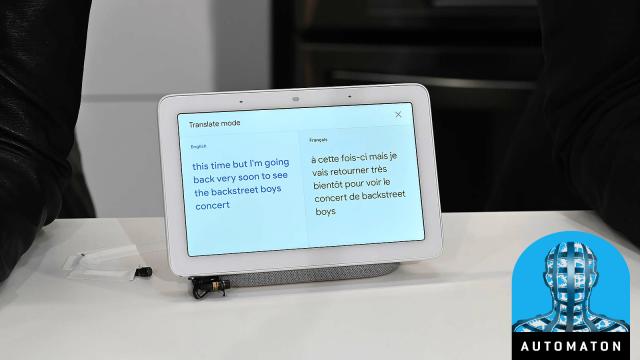Last year was a rough one on AI’s public profile, and rightfully so. Major programs powered by machine learning, like Amazon’s recruiting software, were revealed please regulate us. So it makes sense that Google would lead its 2019 bid for dominance in the AI arena with a feature that drives towards one of our most widely beloved science fictional ideas: a universal translator.
Google’s big play at CES this year is a bevy of upgrades to Google Assistant (and feel free to read “big play” as a child might, as its chief attraction was an actual roller coaster). Leading the pack of said upgrades is Google’s new Interpreter feature, which allows real-time translation in 27 languages. (So, not quite a universal translator; there are some 5,970 languages to go, but still.) And it works—quite well, apparently, according to those who’ve spent some time with it.
We got to try out Google Assistant’s new interpreter mode. I spoke Chinese to a concierge in Las Vegas and he understood me. You can see the mode’s not perfect, it still fumbles translations at times, but it works for the most part. https://t.co/hKsyCTaBid
— Shannon Liao (@Shannon_Liao) January 8, 2019
Gizmodo’s own Sam Rutherford, who is on the ground at CES and speaks Mandarin, says he gave it quite a run through and found that even though he has an accent, it translated all of his basic sentences without issue.
This might not really seem like a huge deal, because language translation has been evolving fairly steadily for years now, and Google’s online translator is pretty good already. (The program actually began in the prehistoric days of 2006, but only switched to a deep learning neural network in 2016.)
But a) Interpreter is good, we have just been supremely jaded by incremental progress; and b) the universal translator is a loaded concept in tech and pop culture—it’s in the echelon of decades-old technological dreams that are on the brink of being achieved, like, say, the tablet computer before it. Babel Fish, the universal translator from Hitchhiker’s Guide to the Galaxy, is as ubiquitous as HAL 9000 or the tricorder, and the idea is as inspirational as it is influential.
Back in 2012, former Google CEO Eric Schmidt himself excitedly proclaimed that science fiction was becoming reality, citing Stark Trek and the Hitchhiker’s Guide and language translation. It’s a holy grail of sorts, as those science fictional dreams directly guide tech companies to a great degree. Every major tech company is in the language translation game—they all want Babel Fish, if not for profit then for pride, and the wow factor. (At the Magic Leap conference last year, a recurring talking point was the aim to be able to have written words translated in real-time through the company’s augmented reality goggles.)
Most importantly, universal language translation is perceived as a universal good, and thus noncontroversial. It is, I think, one of the few use cases for AI that’s unambiguously exciting and poised to deliver a distinct cultural benefit. There will be caveats and complexities, no doubt—there are half a million interpreters employed around the globe, for instance, who stand to lose work, and there are sure to be concerns with storing user language on the cloud—but only good comes of improving communication between cultures.
A couple years ago, when I was in China on a reporting trip, one of the most instructive and genuinely bridging moments came from exchanging a smartphone with Baidu’s translation app with a cab driver to have a conversation about working conditions there. This is something that simply could not have happened even five years before—a pure case of technology enabling a previous unthinkable connection.
Google is positioning its Assistant as a direct competitor to Alexa, so, what better way to imbue its new product with an aura of both mystique and goodwill than by leading off its slate of 2019 products with a stab at universal translation. Interpreter, with its high degree of usability, friendly interface, and nods at achieving an age-old SF dream, aims to clear the air, to quietly assert that Google’s ultra-smart AI companion is there for good, not evil.
